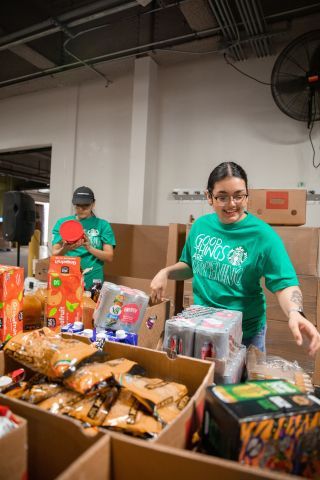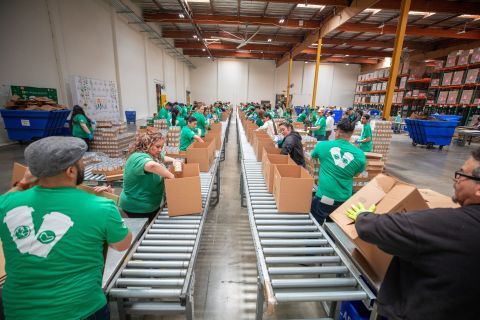Food rescue is one of the solutions to our nation’s hunger crisis, and Starbucks stands as a national partner in advancing this effort.
Starbucks is one of our dedicated partners who generously provided funding for the newly launched Food Rescue Fund, which supports the Food Rescue Challenge— our collective call to action for individuals, companies and communities to rescue an additional 1 billion pounds of good food annually and ensuring it reaches people facing hunger.
Starbucks, a Feeding America Leadership Partner, supports the goal of long-term food security in the U.S. through donations to local food banks through its FoodShare program. Additionally, the company works with food rescue and hunger relief organizations to support innovations in food waste reduction and solutions that increase equitable access to nutritious food in high need and underserved communities.
“Starbucks is committed to contributing positively to local communities by rescuing all our unsold, donatable food and investing in food bank capacity to distribute that food,” said Kelly Goodejohn, chief social impact officer at Starbucks. “We know we cannot end hunger alone, and it’s through partnerships like with Feeding America at the national and local level, that we’re able to test, innovate, and scale our hunger relief programs.”
Sharing is Caring
Responding to their partners’ (employees) advocacy to create a program for donating unsold food, Starbucks in 2016 joined forces with Feeding America to create what would become FoodShare. The real-time donation program deploys third-party refrigerated trucks to Starbucks stores to collect donated food for distribution via food banks and meal programs. Since its inception, FoodShare has provided more than 63 million meals to local communities across the U.S., diverting 75 million pounds of food from waste streams.
FoodShare continues to evolve with Feeding America partner food banks and agencies. Instead of food banks picking up unsold food directly from their local stores, Starbucks now layers those logistics into its own delivery routes where drivers pick up food available for donation while they are delivering new inventory. Implementing this change in 2019, Starbucks streamlined the transportation ecosystem and took the burden of food pickups off food banks.
Today, FoodShare is scaled nationally across Starbucks U.S. company-owned stores, and the Starbucks team continues to work with retail partners, third-party logistics providers, and food banks to innovate and improve the program, while openly sharing their learnings with other organizations.
Enhancing Food Donation Efforts
The FoodShare program is strengthened by Starbucks Capacity Building grants. These funds equip food banks and partner agencies with essential resources like refrigerated vans, freezers and forklifts, enabling them to safely store and distribute rescued food.
Increasing Equitable Food Access
Since 2004, Starbucks has supported Feeding America’s mission, including the launch of a three-year Equitable Food Access grants program in 2021. Awarded to 16 partner food banks, the grants were designed to help food banks provide nutritious food to households in historically under-resourced communities experiencing high rates of food insecurity.
Taking a community-led approach, Starbucks asked local food banks what would work best in their areas. The result? A new slate of grassroots programs, including more avenues to boost Supplemental Nutrition Assistance Program (SNAP) enrollment, new programs aimed at alleviating child and senior hunger, and the deployment of mobile food pantries into community spaces in areas where people live and work but may have limited access to affordable grocery items.
During this multi-year initiative, 16 food bank grantees distributed nearly 11 million meals and served more than 1.6 million individuals, including over 430,000 children.
Click here to learn more about Starbucks' ongoing commitment to hunger relief.


